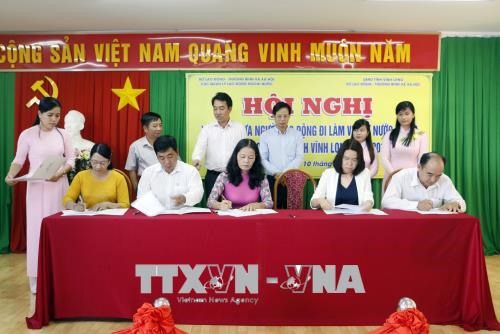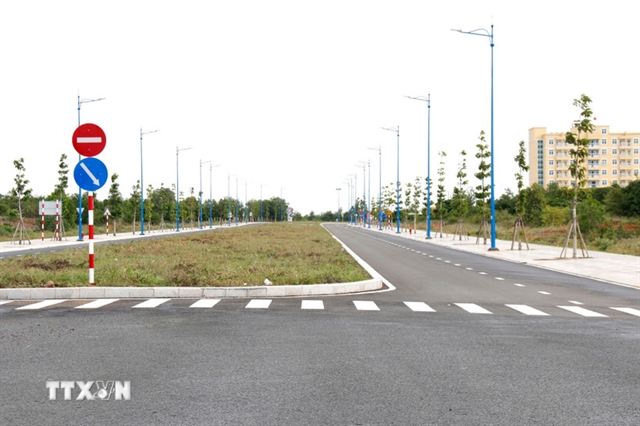 Society
Society

Vietnamese guest workers in foreign countries have contributed to reducing poverty in the Mekong Delta province of Vĩnh Long but the number of workers abroad still remains low, according to the provincial People’s Committee.
 |
| Labour export agreements are signed at a conference on August 10 in Vĩnh Long Province. —VNA/VNS Photo Minh Tuấn. |
HCM CITY — Vietnamese guest workers in foreign countries have contributed to reducing poverty in the Mekong Delta province of Vĩnh Long but the number of workers abroad still remains low, according to the provincial People’s Committee.
Speaking at a conference held last week, the committee’s vice chairman Lữ Quang Ngời said the province had 23 labour export enterprises and an abundant labour force, many of whom could work abroad.
He said there was no close co-operation between relevant agencies and labour export companies, or vocational training schools which offer workers training courses in foreign languages and skills that they could use when they work abroad.
Ngời said that the committee would issue preferential policies to enhance cooperation between enterprises, local agencies and schools.
According to a representative from New Technology Application and Tourism Co. Ltd, local people lack information about reliable addresses as well as neccessary procedures as they seek work abroad.
Moreover, some local residents have consulted unreliable intermediary agencies that charged them a high fee.
Many people who want to work abroad are poor so they face financial problems fulfilling neccessary procedures for working abroad.
Trần Văn Khái, head of the Vĩnh Long Department of Labour, Invalids and Social Affairs, said that since last year loans worth more than VNĐ33.5 billion (US$1.4 million) have been provided to 447 people to work abroad.
The number of working-age people is rather high in the province, Khái said, adding that many people who returned after completing military service are unemployed.
Moreover, the province faces a high number of unemployed graduates, putting pressure on provincial authorities and relevant agencies.
Working abroad can improve workers’professional skills and foreign languages, according to the labour department.
People who return after their labour contracts finish are high quality labour sources for the province.
In the first seven months of the year, 831 people from the province were working abroad, making up only 55.4 per cent of the province’s target.
Eighty per cent of the province’s guest workers were in Japan, 13 per cent in Taiwan, and 6 per cent in Korea and elsewhere.
Trần Quốc Điện, head of the labour division in Trà Ôn District, said that most guest workers save VNĐ400 million to VNĐ600 million each while working abroad.
Last year, 215 people in the district worked abroad, Điện said.
Skill development
Nguyễn Xuân Lanh, vice general director of Esuahai Co.ltd. which recruits workers for companies in Việt Nam and Japan, and provides counselling for Japanese companies investing in Việt Nam, said that local agencies should recruit people who want to study and further their skills.
Lanh said that workers should be trained in the laws of the countries where they would be sent to work, in addition to languages, cultures, labour regulations and customs.
When they return to their hometown, workers could use the skills they learn abroad and start their own businesses in the locality.
Nguyễn Gia Liêm, deputy head of the Department of Overseas Labour under the Ministry of Labour, Invalids, and Social Affairs, said that people who return after working abroad also helped others by providing information about life and work abroad. —VNS




